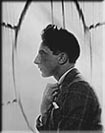![]()
Jean Cocteau was one of the most multi-talented artists of the this century, a true renaissance man - he was a novelist, playwright, director, poet, essayist, painter, set designer, and actor. Cocteau was active in a great many art movements, but he always remained an individual apart and a poet at heart, both literally and in his attitude as reflected in the life that he lived and that within his work. He is now regarded as one of the most important avant-garde film directors.
![]()
Cocteau was born in Maisons-Lafitte into a wealthy family
in 1889. His father was a lawyer and amateur painter, who died when Cocteau
was ten, but had a lasting influence on his son.  Cocteau
published his first volume of poems, Aladdin's Lamp, at the age
of 19 and gained fame with his involvement as writer and supervisor in
Parade (1917), a ballet produced by Serge de Diaghile, with sets
by Pablo Picasso and music by Erik Satie. In 1919 appeared Le Potomak,
a prose fantasy that established Cocteau's reputation as a writer.
Cocteau
published his first volume of poems, Aladdin's Lamp, at the age
of 19 and gained fame with his involvement as writer and supervisor in
Parade (1917), a ballet produced by Serge de Diaghile, with sets
by Pablo Picasso and music by Erik Satie. In 1919 appeared Le Potomak,
a prose fantasy that established Cocteau's reputation as a writer.
During World War I Cocteau served as an ambulance driver
on the Belgian front. Soon after the war he met the future poet and novelist
Raymond Radiguet, whose early death led him to an addiction to opium and
a period of cure. He turned in the 1920s to the psychological novel with
Thomas the Impostor (1923), and Les Enfants Terribles (1929),
and collaborated with Stravinsky on Oedipus-Rex, an opera-oratoria.
In 1929 he was hospitalized for opium poison.
In the 1930s Cocteau started to make films, first of
which, The Blood of a Poet, was based on his own private mythology.
His greatest play, The Infernal Machine, was also written before
WW II. As the result of a bet with the newspaper Paris-Soir, Cocteau completed
the itinerary imagined by Jules Verne in Around the World in Eighty
Days, depicting his travels in My First Voyage (1936). His
close friendship with young Jean Marais started in 1937, when Marais played
the role in the play Knights of the Round Table, and he designed
since then roles especially for Marais in his succeeding works.
In the 1940s Cocteau returned to filmmaking, producing
Beauty and the Beast (1946) and later Orphée (1950).
Cocteau continued leading an active life until 1953 when ill health forced
him into semi-retirement. He then had his face lifted and started to wear
leather trousers and matador's capes. In 1955 he was elected to Belgian
Academy and the Acadèmie Française. Cocteau died in Milly,
outside Paris, on October 11, 1963. He was preparing a radio broadcast
in memory of Edith Piaf and when he head she had expired, he exclaimed:
'Ah, la Piaf est morte, je peux mourir,' and sank into a coronary himself.
Bibliographical Information Kuusankosken kaupunginkirjasto © 1997
Return to Top
